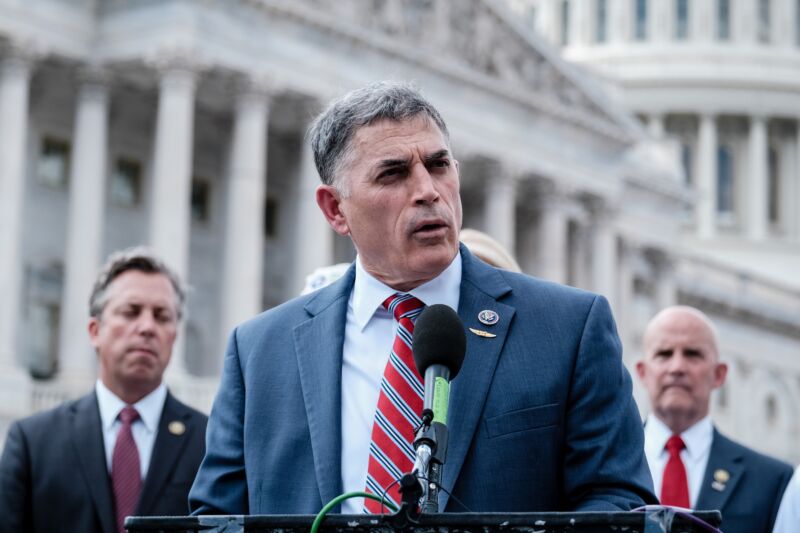More than 65 Republican lawmakers this week introduced legislation to nullify rules that prohibit discrimination in access to broadband services.
The Federal Communications Commission approved the rules in November despite opposition from broadband providers. The FCC’s two Republicans dissented in the 3-2 vote. While the FCC was required by Congress to issue anti-discrimination rules, Republicans argue that the agency’s Democratic majority wrote rules that are too broad.
On Tuesday this week, US House Republications submitted a resolution of disapproval that would use Congressional Review Act authority to kill the anti-discrimination rules. “Under the guise of ‘equity,’ the Biden administration is attempting to radically expand the federal government’s control of all Internet services and infrastructure,” lead sponsor Rep. Andrew Clyde (R-Ga.) said.
Clyde alleged that the “FCC’s so-called ‘digital discrimination’ rule hands bureaucrats unmitigated regulatory authority that will undoubtedly impede innovation, burden consumers, and generate censorship concerns,” and that it is an “unconstitutional power grab.”
Bill co-sponsor Rep. Buddy Carter (R-Ga.) complained about what he called “the FCC’s totalitarian overreach,” which he said “goes against the very core of free market capitalism.”
Clyde and Carter said their resolution is supported by telecom industry trade groups USTelecom and CTIA, and various conservative advocacy groups. The lawmakers’ press releases included a quote from Americans for Tax Reform President Grover Norquist, who said the resolution is “an opportunity to reverse the FCC’s takeover of the Internet.”
Lawsuits more likely to block rules
In 2017, Republicans used the same Congressional Review Act authority to block broadband-privacy rules. But this time, they essentially have no chance of success.
While Republicans currently have a majority in the House, they’d be unlikely to get the new resolution approved in both chambers because of the Senate’s Democratic majority. Congressional Review Act resolutions of disapproval can also be vetoed by the president.
A more likely path to getting the rules blocked is through the courts. The US Chamber of Commerce sued the FCC this week in an attempt to block the rules, arguing that the FCC exceeded its legal authority.
The lawsuit was filed in the US Court of Appeals for the 5th Circuit, which is generally considered to be one of the most conservative US appeals courts. The Chamber has argued that the FCC rules “micromanag[e] broadband providers through price controls, terms of service requirements, and counterproductive labor provisions.”
ISPs are suing the FCC, too. The Texas Cable Association joined the Chamber of Commerce lawsuit. Separate lawsuits were filed in the 8th and 11th Circuit appeals courts by the Minnesota Telecom Alliance and Florida Internet & Television Association.
Broad rules target ISPs and other entities
A US law required the FCC to issue rules “preventing digital discrimination of access based on income level, race, ethnicity, color, religion, or national origin,” and gave the FCC some leeway in how to implement them. The resulting FCC rules let consumers file complaints about alleged discrimination and define the elements the FCC would examine when investigating whether an Internet service provider should be punished for discrimination.
The FCC defined digital discrimination of access as “policies or practices, not justified by genuine issues of technical or economic feasibility, that differentially impact consumers’ access to broadband Internet access service based on their income level, race, ethnicity, color, religion, or national origin or are intended to have such differential impact.”
The rules apply to broadband providers and other entities, such as landlords that restrict broadband options in a building even when multiple providers are available. “Conduct by entities other than broadband providers might impede equal access to broadband Internet access service on the bases specified in the statute,” the FCC said in its rules.
The application of the rules to non-ISPs was one of its controversial aspects. “President Biden’s plan also sweeps entire industries within the FCC’s jurisdiction for the first time in the agency’s 90-year history,” FCC Republican Brendan Carr said in his dissent.
Carr also said that the rules empower the FCC “to regulate each and every ISP’s network infrastructure deployment, network reliability, network upgrades, network maintenance, customer premise equipment, installation, speeds, capacity, latency, data caps, throttling, pricing, promotional rates, late fees, opportunity for equipment rental, installation time, contract renewal terms, service termination fees,” and more.
Chair defended FCC approach
FCC Chairwoman Jessica Rosenworcel said during the November meeting that “our work to close the digital divide is not done until we reach those who are unconnected, underserved, and overlooked.” She defended the decision to “define digital discrimination to include disparate treatment and disparate impact,” saying that “this approach puts us both on the right side of history and the right side of the law.”
Rosenworcel also defended the rules against industry claims that they are too difficult to comply with. “As the law requires, we accept genuine reasons of technical and economic feasibility as valid reasons why it may not be possible for equal access to a provider’s network,” Rosenworcel said. “We will review those defenses carefully and thoughtfully on a case-by-case basis.”
One consumer advocacy group, the Benton Institute for Broadband & Society, supports the rules overall but sued the FCC in an attempt to make the rules more expansive. The Benton Institute said the complaint process should be more robust and that strict rules should apply to recipients of federal broadband deployment grants.
We contacted Rosenworcel’s office about the Congressional Review Act resolution and lawsuits today and will update this article if we get any response.

